

 We the People
We the People

This nation is founded on the premise of granting and protecting personal liberties. The forefathers of the United States of America sought freedom from an oppressive monarchy to establish a democratic government by the people and for the people. The rights outlined in the United States Constitution ensure no infringement upon citizens’ liberties. However, freedoms guaranteed to Americans are not applicable to all. Nor could these original tenants encompass all the needs of a constantly evolving society.
Though this nation’s founders could not foresee the eclectic circumstances of the present, they created a system that protects the formative American values. It is the people of this country who unite in one simple act that continues to protect and liberate men and women within the nation’s borders: voting. Each ballot cast represents a voice and empowers millions of individuals to interpret and create the laws and amendments that shape the future of the United States of America.
Despite differences between young and old, liberal and conservative, local residents and temporary, all are bonded by the home they’ve found within the hills of Appalachia. From a 7-year-old recognizing the importance in participating politically to a Vietnam veteran who fought for his country, but could not cast his ballot, the faces of Athens County speak out on the most basic element of American democracy: voting.
A vote can change the future, but a voice can bring about action. The Bill of Rights contains amendments vital to each citizen. The first amendment grants expressive freedoms including speech, assembly, and religion — the liberties denied under monarchial rule. Although these declared rights have withstood for over 200 years, the current political landscape indicates a great divide in sustaining or amending liberties. This modern age still holds the forefathers’ truths to be self-evident, but as a nation, the people must address emerging questions as society evolves.
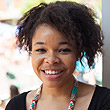
I feel like voting is important because of the whole freedom of speech thing. You want to be able to express what you care about and you want to be able to share that with your government. And if people don’t come out and represent, then there’s no way to see certain things through.
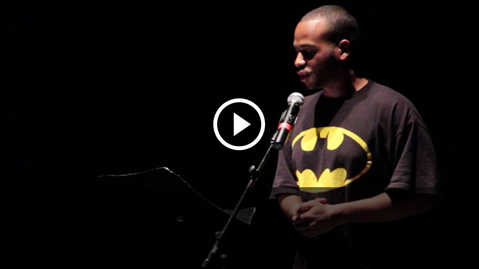
I heard it through the grapevine, Marvin Gaye is God, and what's going on should have been called 'What's already happened.' I say I do spoken word because I can't really paint that well, and I can't sing that well, can't rap that well, but I can definitely write. I guess we live in a fast food culture, so a lot of really deep issues don't get talked about, and that's the reason I do spoken word, is to get those deep issues out there, get people talking about it.
I do put a lot of myself in my spoken word and my music because it's my art. If I don't put my own personality into it, then I just wasted breath, I wasted paper, I wasted ink, I wasted time. When I was growing up I had a very suicidal episode in my life, and writing really saved my life in that aspect. So, yeah, that expression was very much needed for me to stay sane and stay alive.
I've always been a pretty artistic individual. I feel like spoken word is a great opportunity for me to communicate in another way. A lot of people don't quite understand the way that words can move, you know, and I think there's a power in that. There's something about getting that from here, onto there that makes a difference. And then there's something else when you're getting it there, out to here. I would say speech is free. The right to be heard is something that needs to be earned.
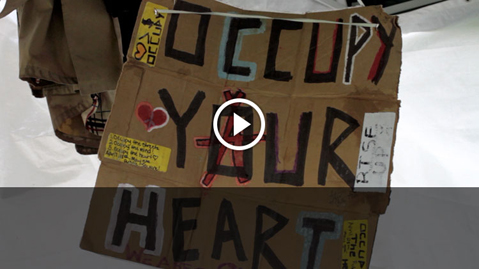
I'm a do-er and a direct action-er. I will stop what I'm doing right now and go do something.
We went out and went to a woman's house that was about to lose her place. You know, the police, were gonna, the sheriff was gonna go in there and take all of her stuff out. Her husband had left her, she had two kids, she didn't know how to pay the bills, and didn't know what to do. So we, we took our tents down to her house, and um, we set up camp. And we brought the media there, we brought our lawyers there, and we bought that woman thirty days.
One of the things that Occupy Cleveland has been focusing on is foreclosures. So I really care about people who, because they are down on their luck or something bad happened along the way, that they're losing their homes.
Movements are never easy. It's always a struggle because no authority has ever given up power by simply being asked nicely or logically or reasonably.
It's fought for. And so I think what we're seeing with Occupy it's not a movement falling apart, but what I think what we saw is one of the first breaking points of people that are finally fed up. And the way that they're fighting back is with speech. And they're fighting back with consensus and they're fighting back with organizing.
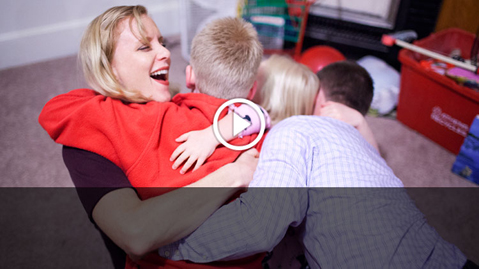
I want to be a compassionate person with tolerance and love and patience and generosity towards my fellow men. I would really like to be like Jesus, and I think it's a really worthy lifelong goal. The fact that I'm a stay at home mom is a definite reflection of my faith. I think if I wasn't taught the way I had been taught as a child that I would have been a career mom for sure.
I try not to, you know, tell my kids this is how you should believe. I try to help them look at things and make decisions on their own and sort of teach them from my own perspective but also to allow them to experience the world and to ask questions and to seek answers for those questions. So I try to be a faithful, tolerant, inquisitive person. My kids are free to make their own decisions.
I really liked the warm welcome we received here. And I like being different and like being unique, and sometimes when you're a member of the super majority you just kind of get passed over like you're invisible because you're just one more person who thinks the same way.
I feel an affinity with Athens. The Athens community is probably the closest, maybe strongest that I've experienced.
I think Mormonism fits into the current religious landscape community really well. It's a Christian belief, I'm a very strong believer in that. It's a way for people to get closer to their families, to get closer to their God, maybe even closer to their communities. You hear a lot of the pollsters saying "Oh they won't elect a Mormon president", but you know if you ask somebody "Will elect your neighbor across the street?", they'd probably say "Yeah!", you know, "Well, he's a Mormon", "Oh! That doesn't care he's my neighbor, I like him, he's a good guy". We believe in God the eternal father and his son Jesus Christ and in the Holy Ghost, and we believe in the scriptures. But I really think the core value in the church more than anything, I guess it's families. We exist here on the Earth among other people to support each other.
You know they say that your hands are Gods hands right. That God isn't here, but he wants us to care for each other. Athens has been, for me, the faith promoting story. For me being here has been such a great thing for us, and I feel like maybe God does love me. And maybe the things that we go through in life really are to make us stronger. I'm starting to have hope that suffering doesn't just weaken you, but it really deepens you and gives you compassion.
The freedoms of speech and assembly have been key in the debate over the Second Amendment. Gun ownership remains a polarizing and divisive subject in the United States. The right to bear arms is a part of the historic heritage of this country, but rising gun violence has some members of society questioning the necessity for civilians to bear arms. This liberty was derived in an age wrought with war on American soil. But in an era of homeland peace, citizens have begun to question the scope of this right, while others consider it unalienable.
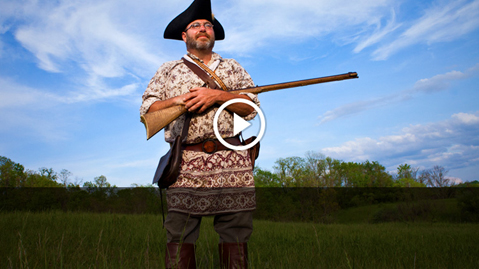
I do living history as a hobby because I enjoy most of all the people and also the education aspect of it. This here is a flint lock rifle. This is what a pioneer would carry with him... The most intriguing thing is the study of history and I've often heard that if you don't know history, you're bound to repeat it.
My first experience with firearms is my father was also a gun advocate. First thing he did, was he explained the safety aspects of firearms and what they would do to things. And he actually took us out and showed us what they would do when you fired at a jug full of water.
Right now, currently, I'm building rifles for people to pass down to their grandchildren, their children to their grandchildren, to cherish. Making rifles is a it's a complete joy to make anything. There is something peaceful about making something with your hand. And, uh, when I finish a rifle I have a sense of accomplishment and it is one way of leaving a little bit of me behind. When I'm long gone, those rifles and my artwork will still be here for many centuries.
The earliest memory I have, I was with my dad. He took me out deer season. We were walking back this trail, to go to this tree stand and, um, a buck jumped out and stopped, shot it, tracked it down and that was that. My adrenaline was going real bad and I was like, shakin'. It was a pretty big rush at first.
I think a big misconception is it leads to violence and bad actions just because maybe a couple people make some bad decisions. It kind of ruins it and makes a name for everyone else, but its obvious that not everyone is like that.
I deal with felony laws and so any violation of the law that's a felony that involves firearms is typically what I would deal with. A lot of people think more laws help, I always think that enforcement of the laws that we have would be appropriate. Really, its drugs and alcohol, um, that cause the problems with firearms. Typical law abiding citizens don't have any trouble with them.
The primary reason I do it is so people will be safe. And that's my job, I guess, as a firearms instructor. I think I was four or five years old, first time I ever pulled a trigger on a gun. And you know, I was scared obviously but was also fascinated of the noise and the smell. And then, you know, being that I'm a country kid, and uh, Appalachian, you just guns are a part of our culture.
Firearm disciplines we teach rifle and shotgun and then, we teach pistol also. But there's a fair amount of, uh, pressure here, for people who want to have a concealed carry handgun with their self. We do eight hours in the classroom and four hours on the gun range. Buy a gun, keep it, practice it, take somebody who has never shot one out. Uh, educate him or her to it, and uh, keep the practice of owning your gun, keep it right out front because if you don't, you won't have it.
I got introduced to guns by my dad, he worked with the division of wildlife. So, I was just kind of always around them. He's retired now, so when I'm home on breaks and stuff, we can go shooting whenever and it's pretty cool. I'm a girl so I guess it's kind of funny to people, or I don't look like a gun enthusiast.
When I go to the shooting range, it's like older guys. So I look a little out of place. I absolutely think people should have the right to bear arms. People that don't know anything about them could, like, take a class. Like even in my concealed carry class, even if you don't plan on carrying, like, it's just so much information and it was really cool. Like, even I learned a lot that I didn't know. People shouldn't fear guns, that's what causes problems.
The Second Amendment was put in place on purpose.
Like the computer sitting on the table, a firearm doesn't do any harm. It's when somebody uses it improperly.
Safety is the number one thing when it comes to firearms. I mean that should be the utmost thing on your mind.
Two things to buy, you can never go wrong with; one is land and two is guns. One, they can't make any more land. Two, guns never lose their value.